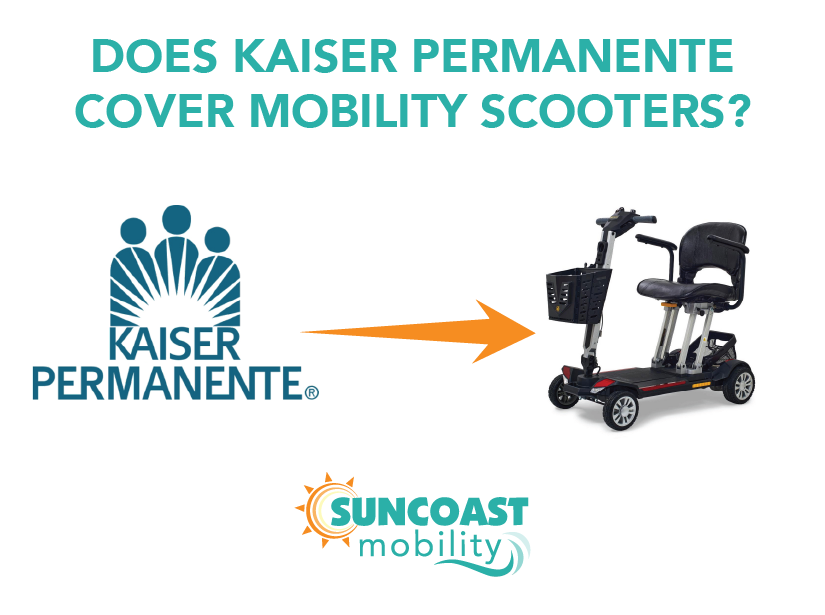Table of contents
Does Kaiser Permanente Cover Mobility Scooters?
For people who rely on mobility assistance, one of the most common questions is: Does Kaiser Permanente cover mobility scooters? The answer depends on your specific plan, medical necessity, and whether your scooter qualifies as durable medical equipment (DME). Understanding your coverage before making a purchase can save you money, time, and stress.
This complete guide breaks down how Kaiser Permanente handles mobility scooter coverage, what requirements you’ll need to meet, and how to maximize your benefits.
Why Coverage for Mobility Scooters Matters
Mobility scooters are much more than a convenience—they are often a medical necessity for people living with chronic illnesses, injuries, or disabilities that limit their ability to walk. For many individuals, a scooter provides the freedom to move around the home, run errands, visit family and friends, and stay engaged in the community.
Without a reliable mobility aid, everyday tasks like cooking, bathing, or shopping can become overwhelming or even impossible. That’s why access to a mobility scooter can dramatically improve overall quality of life, helping people stay active and avoid long-term complications that may arise from immobility.
The challenge, however, is cost. Depending on the type, features, and brand, mobility scooters can range from $800 to over $3,500. Lightweight folding scooters, heavy-duty bariatric models, and long-range travel scooters often come at a higher price point. For seniors on fixed incomes or individuals already dealing with high medical expenses, this can make purchasing a scooter out of reach.
That’s where health insurance comes in. Providers like Kaiser Permanente recognize that mobility devices fall under durable medical equipment (DME) and may cover part or all of the cost if the scooter is deemed medically necessary.
Does Kaiser Permanente Cover Mobility Scooters?
So, does Kaiser Permanente cover mobility scooters? The short answer is yes—Kaiser Permanente may cover mobility scooters if they are considered medically necessary and prescribed by a qualified healthcare provider.
In most cases, mobility scooter coverage falls under the category of durable medical equipment (DME) benefits. This means that your plan may pay for all or part of the cost of the scooter, but the exact amount depends on several key factors:
Your specific Kaiser plan – Coverage differs depending on whether you’re enrolled in Medicare through Kaiser Permanente, an employer-sponsored plan, or an individual plan.
Medical necessity requirements – A doctor must certify that you have a condition that makes it difficult or unsafe to walk long distances without assistance.
In-network DME providers – Most Kaiser Permanente plans require that you obtain your mobility scooter through their network of approved DME suppliers.
Prior authorization – Many Kaiser plans require pre-approval before covering a scooter. This usually involves submitting medical records, a prescription, and sometimes a mobility evaluation form.
Because Kaiser Permanente operates in multiple states with varying policies, it’s important to contact your local Kaiser office for personalized details.
Medical Necessity: The Key to Approval
When it comes to Kaiser Permanente mobility scooter coverage, the most critical factor is medical necessity. Insurance companies—including Kaiser—do not consider mobility scooters as convenience items for comfort or leisure. Instead, they are only covered when proven to be essential for maintaining your health, safety, and independence.
Why Medical Necessity Matters
Medical necessity is the standard Kaiser uses to decide whether a mobility scooter is truly required. This ensures that scooters are reserved for patients who cannot safely meet their mobility needs with less complex aids like canes, walkers, or manual wheelchairs. Coverage is meant to support individuals whose quality of life and health outcomes would otherwise be at risk.
The Role of Your Doctor
Your physician plays the most important role in this process. They must provide comprehensive documentation explaining why a mobility scooter is required for your condition. This often includes:
Medical records showing your diagnosis and mobility limitations
Test results (such as balance or strength assessments) that demonstrate why walking without assistance is unsafe
Physician’s notes describing how your mobility challenges affect daily living
A Certificate of Medical Necessity (CMN) or prescription that clearly states why a scooter is essential rather than other mobility aids
A detailed medical file strengthens your case and reduces the chance of delays or denials.
Kaiser Permanente’s Typical Medical Necessity Criteria
To approve a mobility scooter, Kaiser Permanente generally reviews whether you meet certain requirements:
-
Inability to walk safely without assistance – You must show that you cannot move around your home or community without support and that doing so places you at risk of falls or injury.
-
Difficulty performing activities of daily living (ADLs) – If your condition makes it hard to perform essential tasks such as bathing, cooking, dressing, or moving between rooms, this strongly supports medical necessity.
-
Ability to safely operate a scooter – Kaiser will consider whether you have the coordination, strength, and cognitive ability to control a scooter. If you cannot, a power wheelchair or alternative support may be recommended instead.
-
Home accessibility – Your living space must accommodate a scooter. Narrow hallways, small doorways, or major obstacles may limit eligibility since the scooter would not be usable in your environment.
Why Some Claims Are Denied
Without meeting these requirements, Kaiser Permanente is unlikely to cover the cost of a mobility scooter. For example, if your doctor’s notes only mention general weakness but do not show why a cane or walker is insufficient, coverage may be denied. Similarly, if your home is not accessible for scooter use, Kaiser may not approve a device that cannot realistically improve your mobility.
Pro Tip for Success
When speaking with your doctor, ask them to clearly explain why other mobility aids (cane, walker, manual wheelchair) are not suitable for your condition. The more specific and detailed the documentation, the stronger your case will be. For instance, rather than simply stating “patient has difficulty walking,” your doctor might write “patient cannot walk more than 20 feet without resting, has a history of falls, and cannot safely use a walker due to balance issues.” This type of detail significantly increases the likelihood of insurance approval.
How to Get a Mobility Scooter Through Kaiser Permanente
If you believe you may qualify for coverage, the process of getting a mobility scooter through Kaiser Permanente involves several important steps. Taking the time to follow these correctly can help you avoid delays, denials, or unexpected out-of-pocket costs.
1. Schedule a Doctor’s Visit
The first step is to make an appointment with your primary care physician or a specialist within the Kaiser network. During this visit, your doctor will carefully evaluate your mobility limitations, daily challenges, and medical history. They may ask questions about how you move around your home, your risk of falls, and whether you’ve already tried using other mobility aids such as a cane, walker, or manual wheelchair.
2. Obtain a Prescription or Certificate of Medical Necessity (CMN)
If your doctor determines that a mobility scooter is medically necessary, they will provide a prescription or Certificate of Medical Necessity (CMN). This document outlines your diagnosis, physical limitations, and the justification for why a scooter is required rather than other mobility devices. A strong CMN is critical for insurance approval.
3. Submit Medical Documentation to Kaiser Permanente
Your prescription and supporting medical records must then be submitted to Kaiser Permanente for review. This package may include progress notes, test results, and details about your ability to perform activities of daily living (ADLs). The more detailed and thorough the documentation, the greater the likelihood of approval.
4. Seek Prior Authorization (if required)
In many cases, Kaiser requires prior authorization before you can obtain a mobility scooter. This means the insurer must formally approve the request before purchase or rental. Without this step, even a valid prescription may not guarantee coverage. Prior authorization ensures that the scooter meets medical necessity criteria and that it comes from an in-network supplier.
5. Work with an In-Network Durable Medical Equipment (DME) Supplier
Once authorization is granted, Kaiser Permanente will direct you to an approved durable medical equipment (DME) supplier. Working with an in-network supplier is essential—if you purchase a scooter on your own from an out-of-network company or an online retailer, you may not be reimbursed. The supplier will help match you with a scooter that meets both your medical needs and insurance requirements.
6. Receive Your Mobility Scooter
After the order is processed, you will receive your mobility scooter. Depending on your Kaiser plan, the scooter may be provided as a rental (with monthly coverage) or as a purchase (which you keep permanently). Delivery and setup are usually arranged through the DME supplier, and they may also provide instructions on safe use and maintenance.
Frequently Asked Questions
Does Kaiser Permanente cover mobility scooters?
Yes, if they are deemed medically necessary and obtained through an in-network provider.
How much will I pay out of pocket?
Costs vary by plan, deductible, and coinsurance. Always confirm with Kaiser before ordering.
Are travel scooters covered?
Coverage usually applies to standard scooters for home and daily mobility use. Lightweight travel scooters may not always qualify.
What if my claim is denied?
You can file an appeal and submit additional medical documentation.
Can I buy a scooter online and get reimbursed?
Usually no—Kaiser requires in-network DME suppliers for coverage.
Final Thoughts: Kaiser Permanente Mobility Scooter Coverage in 2025
So, does Kaiser Permanente cover mobility scooters? Yes—but only if you meet the medical necessity requirements and follow the proper process.
The key to approval is preparation:
-
A detailed prescription and medical documentation
-
Proof that lesser mobility aids are insufficient
-
Compliance with prior authorization and DME supplier rules
-
A safe and accessible home environment
By following these steps, you can increase your chances of approval and reduce unexpected expenses.
At the end of the day, Kaiser Permanente mobility scooter coverage can restore independence, reduce fall risks, and allow you to remain active in your home and community.










